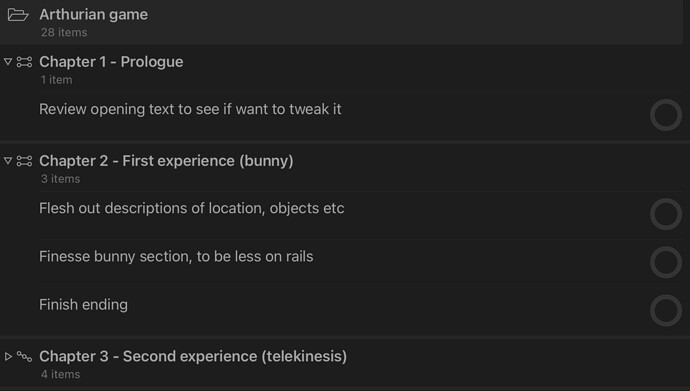Thought I’d start a thread about where I am with my writing, in case anyone else is in a similar position / has suggestions.
Very unusually I’m long term ill with a progressive neurological illness, which has wiped out the last two years especially for me (I’ve been seriously ill for 27 years since age 22) as in 2020 we tried an experimental reduced treatment, and then my disease repeatedly flared throughout 2021. So IF has been on the side burner for 24 months, apart from some judging/reviewing of IF Comp managed miraculously.
I’m starting to come out of the latest flare and wanting to write IF again. I generally write parser games in Inform 7. I’m a very old timer and it’s the style of IF I’m most used to, and have coded in for decades.
I’ve various old projects in various stages of development, and find myself returning to those. On the one hand I’m inspired by my design notes, and keen to move on. I prefer to design with pen and paper before coding, or swap between the two in spurts. My games tend to be episodic, using scenes in Inform 7.
On the other hand I feel a bit like an excitable puppy, not sure what to play with or sniff next!
The four main games I have currently in development are:
1/ a Lovecraftian one, mostly coded, but lots still to do
2/ an Arthurian esque one, only tentative starts to the coding, but loads of ideas on paper
3/ a conversion/expansion of a MUD castle/quest I coded back in the early 1990s in LPMUD, converting it to a Scottish ghost game now.
4/ a museum set piece, exploring history through artefacts in the museum, which you are responsible for as the curator
Of these the second one currently excites me most, so I think I’m going to give it most attention for now. Mainly designing on paper - eg I was working on more this afternoon - before coding. At least being episodic it does lend itself well to intermittent development.
The Lovecraftian one is closest to finishing but I think I need to be more mentally alert and well neurologically to polish it properly.
The ghost one is fun, and excites me, but needs more planning.
And the museum one is an aspirational future goal, though I have scribbled down tons of design ideas for it.
I suppose my main question out there is how to manage game development effectively when you can only work on it very sporadically and unpredictably. How to keep the enthusiasm etc.
For now my plan is to go with my hunch re what appeals to me most. I also know there will be long periods where I can’t do anything, so won’t fight that. But I’m hoping to creep forward with things. Though not setting any goals or deadlines.
Anyone else out there in a similar position? And if so what approaches work for you? Thanks 
 But all tips are appreciated, which may help more folks than me.
But all tips are appreciated, which may help more folks than me.


